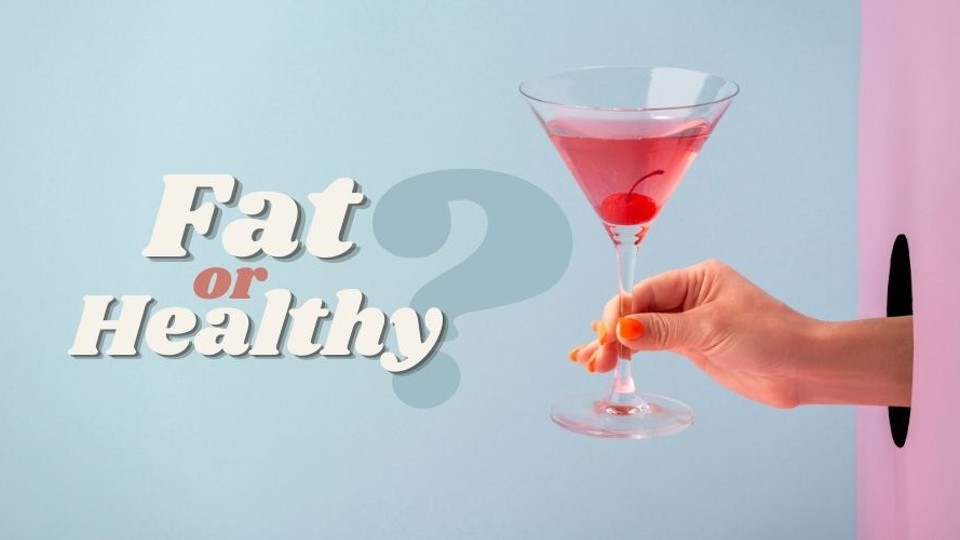
Alcohol is a diuretic, that causes you to need to pee more often and if you don’t rehydrate properly, you may weigh less the next day simply because you’re dehydrated.
- Up to 1 standard drink (10g ethanol) a day for women and men above the age of 65 years.
- Up to 2 standard drinks a day for men under the age of 65 years.
- A 375mL can of mid-strength beer (the same amount of full-strength beer would be 1.4 standard drinks)
- 100mL red or white wine
- 30mL spirits
- 200-250mL pre-mixed drink
How alcohol affects your health
Potential benefits
When it comes to your heart health, it’s a little complicated.
It’s true, a small amount of alcohol a few times a week has been linked to lower risk of heart disease and total mortality.[1]. That’s because it slightly increases your high-density lipoprotein (HDL) levels. HDL is considered the “good” cholesterol that helps protect your heart by helping to remove excess cholesterol (the kind that clogs up your blood vessels) from your body. Before you get too excited, these benefits only applies to people who consume alcohol regularly in small amounts and doesn’t include people who drink alcohol irregularly in high volumes.
There is also evidence that women who had consumed a moderate amount of alcohol had a reduced risk of developing type 2 diabetes, compared to non-drinkers. On the other hand, there appears to be no reduction of risk for developing type 2 diabetes for men who are moderate drinkers or non-drinkers. [2]
It’s important to note that it is not recommended for individuals who don’t drink to start drinking. The potential benefits of alcohol on reducing cardiovascular disease risk can be exceeded through a healthy diet and regular exercise.
Potential Consequences
Time for the less-exciting news.
While moderate alcohol consumption has some heart-protective benefits, the safest level of alcohol is still zero. Alcohol affects every organ in your body.
Even a single drink per day increases the risk of developing cancer of the breast (in women only), mouth, oesophagus, liver and colorectum.
Excessive drinking (more than 10 standard drinks per week) can contribute to high blood pressure, weakened or damaged heart muscle, stroke and heart failure. It can even shrink your brain with heavy drinkers at risk of B1 (thiamine) deficiency which can lead to Wernicke-Korsakoff syndrome. This is form of brain damage that causes confusion, inability to control movements, eye abnormalities and it can lead to a coma. Alcohol interferes with your body’s ability to absorb and use thiamine.

How you drink matters more than the type of alcohol!
When the number of drinks per week are equal, it is clear that how spread out the drinks are over the week matters more than what you’re drinking.
Having all seven drinks spread across two days is linked to a higher risk of mortality, compared to having it evenly spread out across 7 days. That’s why it’s more helpful to stick to the daily suggestions for alcohol (rather than a weekly total). [3]
You’ve likely heard that wine is better than beer, because they are high in antioxidants. While is it true that wine is rich in antioxidants that may protect the heart, studies have shown no difference in chronic disease risk between types of alcohol. All types of alcohol were linked to a higher risk of developing breast cancer and a lower risk of developing heart disease.
Your goals, your choice
Whether you choose to drink is completely up to you but be aware that drinking alcohol can be a double whammy when it comes to reaching your goals. Alcohol is energy dense and not very filling. Alcohol is 7kcal per gram which is more energy-dense than protein and carbohydrates per gram (4kcal/gram).
It’s not just about the calories in the alcohol; it can also impair your ability to stick to your pre-planned healthy decisions. Contrary to the popular belief, drinking on an empty stomach doesn’t work to “save calories.” The drunker you get, the more impulsive your behaviour can become, and you are less likely to stick to your initial plan of making healthy choices. You might also find that you lose track of what you’re drinking and eating.
Want to enjoy a few drinks without compromising your goals?
- Know your upper limit BEFORE the party starts. Where is your sweet spot that allows you to have a good time while still aligning with your goals (and hopefully saves you from a banging headache the next morning)? Plan ahead for how many and what type of drink you want to consume beforehand.
- •What you add into your alcohol can also add up fast. If your drink of choice is a cocktail – keep it mind that high calorie mixers may be used including coconut cream/milk, cream, soft drinks, sugary syrups. Low calorie mixers include soda water or choose the no-sugar option for cordial, juice or soft drinks.
- Map out your alcohol and alcohol-free days for the week to complement your training. Where possible, structuring alcohol days on training days (after completing the training). This allows you to use the following rest day to recover from your hangover and prevent it interfering with your training session. When have you ever had a good training session hungover? It should be noted that alcohol after training does reduce muscle protein synthesis but unless you are consistently drinking after working out, this is unlikely to have a meaningful impact on your muscle growth.How many alcohol-free days is recommended? A minimum of two alcohol-free days per week is recommended with up to two drinks per night.
- The drunk hunger and hangover hunger are both commonly reported phenomenon. Have a go-to meal in the fridge, for the night of or the morning after. Chances are you won’t feel like cooking, so keep it simple and easy. My go-to healthy hangover breakfast is eggs and avocado on toast – with a big cup of coffee. If you’re feeling nauseous or that is just too much effort, microwavable rolled oats with drizzled peanut butter is a lifesaver.
- Don’t forget to stay hydrated. Water is the best choice, but coconut water and herbal teas can make it easier to get more fluids in.
Although it is more difficult to reach your health and fitness goals while drinking, it is possible to reach them and still enjoy the occasional drink. If you want to reach your goals faster, it may be a good idea to cut back on your alcohol consumption. If you notice that you are struggling to limit your alcohol intake, reach out to your healthcare provider for support.



